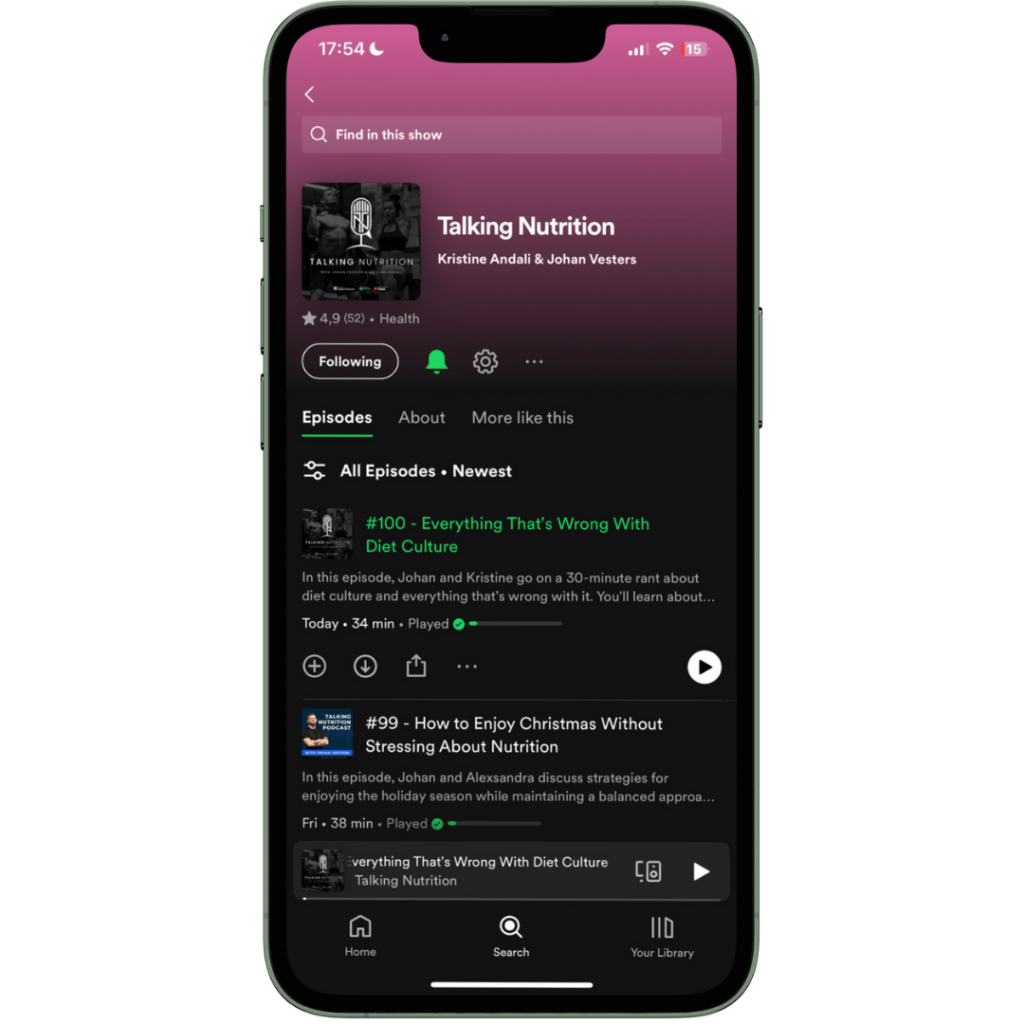Don’t be Like Most People
The first weeks of the year are always interesting.
You’re motivated to take action, you get a fresh start, and motivation is through the roof.
You want to lose body fat, put on lean muscle, and improve your health.
This time, you’ll make it work!
This time it’ll be different…
And you know what?
Yes, this time CAN be different.
But only if you stop trying the same unsustainable diets and quick fixes that failed you in the past.
If you want a different output, change the input.
The research is clear when it comes to New Year’s Resolutions: in February, about 80% will already fail.
By December, that number is as much as 88–91%…
But hey, let’s focus on what matters here: how you can be among the 10% who DOES make it.
Don’t do what most others do,
because most of them fail.
Five Common Mistakes Among New-Year’s-Resolutioners
Based on uncountable consultations and conversations with hundreds of nutrition coaching clients, I feel like I have a good idea where it usually goes wrong…
These five common mistakes don’t just apply to New Year’s Resolutions by the way.
It’s the stuff that makes reaching ANY health and fitness goal almost impossible.
These five mistakes are:
1) The diet is too strict and unsustainable.
2) People are impatient and expect to reverse years of bad habits in a matter of weeks.
3) The All-or-Nothing mindset, which doesn’t allow for anything but perfection.
4) There’s a lack of strategy and long-term planning.
5) People over-rely on motivation.
Let’s break these down one by one, so you know exactly what to look out for and avoid doing.
(Again, don’t be like ‘them’!)
Mistake 1: The Diet is Too Restrictive and Unsustainable
- You’re not allowed to eat any sugars, or any other type of carb for that matter.
- You only get a limited amount of foods or recipes to choose from.
- You replace real food with meal bars or shakes.
- You only drink green juices for a few weeks.
- You don’t eat at all every other day.
- lean proteins,
- vegetables,
- fruits,
- and eat more whole foods in general…
Mistake 2: People are Impatient
Patience and time – as well as effort – are ESSENTIAL for long-term growth and lifestyle change.
We all know that… But when it comes to reaching your goals, it needs to be as soon as possible, with as little effort as possible.
Reality is…
You can not expect to reverse many years of bad habits in a matter of weeks.
Back when I was overweight (110+ kilos), out of shape, and unhealthy, I also hated it.
I also want to change it ASAP and see 1kg of weight loss per week…
But it took years of eating more and more junk food, smoking and drinking, and not working out, to get to that point.
So I had to get real with myself, and understand that in order to reverse the damage done, it wasn’t just going to take a few weeks of quick-fix diets and supplements…
I’m sharing this with you, because I know you wish you could get the results yesterday.
But you got to be patient and give yourself more than a few weeks here. You can’t rush the process.
Think about the 80% who’ll give up one month into the New Year.
ONE MONTH…
Now, you can create amazing results in the short term.
Only a few weeks of lifting weights, tracking your food, and cleaning up your diet can make a huge difference.
But big goals and long-term success requires big input and long-term effort.
Do whatever it takes to train your patience-muscle.
You’ll need it…
Mistake 3: There’s a Lack of Planning and Strategy
Imagine showing up at the airport without your passport, no luggage, and with no flight booked. All you know is you want to get to *insert exotic dream destination*, but you did zero preparation…b
Sounds silly, right?
This is exactly what many people do when it comes to their New Year’s Resolutions.
The goal is: “I want to lose weight”.
But the exact what, how, who, etc. is completely neglected.
There’s no preparing for the journey ahead.
First, before you even get started, address where you’re currently at. What needs to get done before you jump into another weight loss phase? What do you struggle with, and what habits need changing first?
Second, planning for your fitness goals – needs to keep in account both your goals AND real-life events.
For example: last month through Christmas, our clients took breaks at maintenance. Anyone who was in a fat loss phase, moved out of it on time, and they stepped away from things like tracking. This was all personalized to the individual, and planned for ahead of time.
That way they were ready for a more flexible period without having to go overboard. We already knew the Holiday Season was coming up WAY in advance, so we created a simple action plan to execute. Also knowing, that in January 1st, it was GO-time again.
Third, awareness and planning are key, but do you have an exit strategy in place too? Do you know what to do AFTER having reached your goal?
Most diets are set up as X-week events and don’t teach you what to do after reaching your goal. Are you supposed to go back to ‘normal’?
(Hint: the answer is NOPE. For the new-you to grow, your old-you needs to go.)
Avoid the mistake of having no plan and strategy in place.
Create a 6-12+ month plan that breaks down your big goal into smaller goals, into weekly and daily actions. Include the different seasons of nutrition. Don’t try to diet all year round, but spend lots of time nourishing and fueling your body.
Now, I know this all may sound like a lot, but we’re getting you ready for REAL, lasting results here.
Yes, you need to get started. But we want to focus your hard work toward the things that actually help you move forward.
This is where guidance, education, and accountability comes in…
Coaching and mentoring is one of the very few real shortcuts in life. It’s something I truly believe in. It’s why we do what we do at OCS, and why my team and I continue to invest in coaching and mentoring ourselves.
If you want to learn more about how we can help you reach your goals, I’m happy to offer you a complimentary call on the house (click to apply for FREE).
That way, you get a chance to share your goals and struggles, and ask any questions related to reaching them. Then, we’ll talk strategy and see we’re a good fit for each other.
Whether you then decide to move forward or not, I’ll still give you actionable advice to move forward.
Before you continue reading, apply here so I can get back to you within 24h.
Then… for the next mistake…
Mistake 4: ‘All or Nothing’ Thinking
So many New Year’s Resolutioners fall into ‘All or Nothing’ thinking.
Do you ever catch yourself doing the following?
- Your diet’s either all super ‘clean’ and in tiny portions, or you’re enjoying the weekend.
- You either work out every single day, or you might as well not go at all.
- During the week you’re extra strict, but then when the weekend comes it’s a free-for-all.
- Either you hit 10.000 steps every single day, or it doesn’t count.
- Food is either ‘healthy’ or what you ‘normally’ eat.
- You’re ‘on’ or ‘off’ plan.
As you’re reading this, you’re likely still full of motivation. But don’t think everything needs to be super strict, extreme, and ‘perfect’ for it to be worth your effort.
Here’s what usually happens this time of the year.
You ‘enjoyed yourself’ for all December because you ‘didn’t want to worry about food’ over the Holidays. Aka: ‘NOTHING’.
And now that it’s January, everything needs to change all at once. Aka: ‘ALL’.
From January 1st, you’ll walk more, eat more protein, and workout every day, read more, sleep more, eat only clean foods, and, and…
Guess what will happen come February…
Will you last once motivation fades, and when you’re hit with your first setbacks?
(Spoiler alert: both will happen. It’s not if, it’s when.)
Sure. Overtime, you’ll be able to work on that laundry list of things you want to improve. But especially if you still got a lot to work on, let’s start with the basics first.
Are you tracking consistently, so you can adjust once you’re ready to start a fat loss phase?
Do you mostly eat whole foods, enough protein, fiber, etc.?
Are you lifting weights?
Whatever it is you need to work on, focus on a few of the big ones first.
Also remember that a fitness journey without failure does not exist. It’s where you’ll learn the most! Expect friction, and keep a growth mindset (more about that here).
How you respond to failures determines your success…
Many will stop trying in February because they can’t get it all ‘perfectly’. If you want a different outcome, don’t do what they do.
Embrace the fact that your journey comes with ups and downs. You probably won’t be able to change everything all at once.
Avoid all-or-nothing thinking at all costs,
Take imperfect (but consistent) action.
What I’ve found to be a helpful tool for changing habits is a Habit Tracker (click to download mine for free) to keep track.
As little as 1-3 daily actions is likely what you’ll need to get things moving again. Then once you’re on a roll, you can cover the next thing on your laundry list of ‘things to change’.
Mistake 5: Relying on Motivation
Motivation is finite and unreliable.
It shows up unannounced when things are already going well, but it won’t be there for you when you need it the most.
Please read that again, and let it sink in.
Motivation shows up when things are ALREADY going well, and it won’t be there when you need it the most.
You need to take action first to create momentum,
then once you’re on a roll and you begin to see results,
then motivation kicks in.
Motivation can work as a nice boost and can definitely help you take that big, scary step of getting started.
But know that it’s unreliable and it won’t stick around for long.
Think about your future-self, the person you aspire to become. Picture where they’re at, what character traits they have…
Will they rely on motivation or take action regardless of how motivated they feel?
You see, even if you’re not motivated, you can still take the same actions you would take if you were motivated.
It will feel like more work and you will have to push yourself more, but when you’re NOT motivated and you still take action…
THAT is when you make a real difference.
See it as a test of character. A test to see if you have what it takes to keep your New Year’s Resolution.
Action comes before motivation.
How to NOT Fail Your New Year’s Resolution in 2024
Quick recap. In 2024:
- avoid restrictive diets and find a more sustainable, additive approach,
- be patient and allow yourself the time it takes to change your habits,
- toss the ‘all or nothing’ mindset out the window and take imperfect action,
- avoid going in without a plan, and have a strategy in place that helps you prepare, execute, and sustain,
- don’t wait for motivation to do it for you, take action even if you don’t feel like it. It’s what it takes.
Lastly, remember that it’s OK to ask for help.
If you don’t manage to figure things out on your own, then look for guidance.
Get an accountability buddy. Look for those around you who already reached the goals you want to achieve. Get a coach who specializes in helping people like you. Or even if you don’t end up getting coached, at least ask them questions about the things you struggle with.
Thank you for reading another one of my articles. I appreciate you!
Please do feel free to message me here and ask me anything. I got a lot of help on my own journey, so I’m more than happy to pay it forward!
I wish you all the best in 2024.





